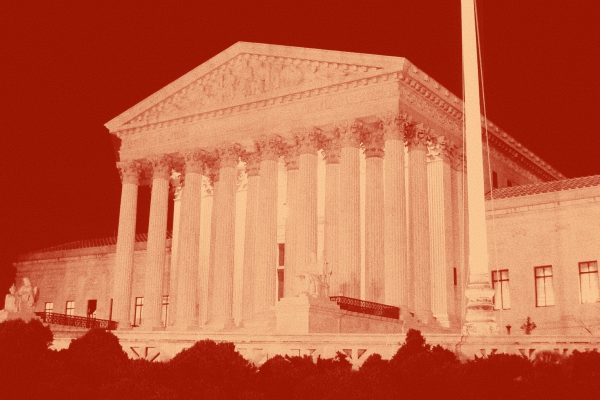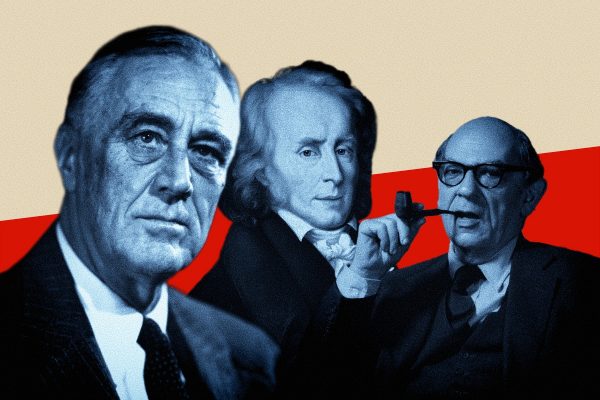Can the Religious Freedom Restoration Act (RFRA), which grants religiously motivated exemptions from other federal laws, distinguish between nonprofit and for-profit activity? The Green family—owners of retailer Hobby Lobby, who sought such an exemption from the Affordable Care Act’s contraceptive mandate—argued that it cannot. And the Supreme Court, in its long-awaited opinion, agreed.
The supposed indistinction between nonprofit and for-profit activity proved to be a conceptual centerpiece of the Court’s reasoning. Writing for the majority, Justice Samuel Alito summarized the point as follows. “The term ‘person,’” which determines what entities may seek religious exemptions, “sometimes encompasses artificial persons . . . and it sometimes is limited to natural persons. But no conceivable definition of the term includes natural persons and nonprofit corporations, but not for-profit corporations.” (emphasis added)
Arguments such as this are common in legal reasoning. We are often told that law can’t conceive of distinctions familiar to everyday life. In spite of its prevalence, however, this is an odd style of argument. I don’t mean that Alito’s claim, in particular, is odd; I mean all versions of this claim are odd. The very act of articulating a distinction—the first-step in explaining that the distinction can’t be drawn—implies that, in fact, the distinction can be drawn. Otherwise, it couldn’t be articulated. Put differently, of course there is a conceivable definition of “person” that includes natural persons and nonprofit corporations, but not for-profit corporations—Alito himself conceived of it. The question is not whether the law could draw that distinction: it could, and, in practice, often does. The question is whether it should do so.
On that front, many of Alito’s arguments concern general legal practices: how the law has dealt with the distinction between nonprofit and for-profit activity historically and how it does so in various settings today. These arguments, however, are neither here nor there. RFRA, like all statutes, serves a specific purpose—in this case, to safeguard religious freedom in a pluralistic world. Hobby Lobby is the first case to explore that purpose as applied to for-profit corporations. As such, to point out that for-profit corporations enjoy rights similar to nonprofit entities in other settings sheds no light on whether for-profit corporations should enjoy rights similar to nonprofit entities under RFRA. Nor is it helpful—for the same reason—to point out contexts in which for-profit corporations and nonprofit entities are treated differently: say, for tax or disclosure purposes. The answer to whether RFRA protects the religious exercise of for-profit corporations must rise and fall on its own merits.
With that in mind, what are Alito’s reasons for extending religious exercise rights to for-profit corporations? And under scrutiny, how do they fare?
I count two. First, responding to the lower courts that ruled against Hobby Lobby on the grounds that “the purpose of [for-profit] corporations is simply to make money,” Alito argues that corporate law tells a different story. “While it is certainly true that a central objective of for-profit corporations is to make money,” Alito writes, “modern corporate law does not require for-profit corporations to pursue profit at the expense of everything else, and many do not do so.” Noting that companies sometimes fund charities and take on the expense of environmentally friendly policies, Alito concludes that, in general, for-profit corporations are not motivated exclusively by finances. Specifically, he asserts that “religious objectives” are among the non-financial considerations that might influence corporate behavior.
The best that can be said for this argument is that it is irrelevant, the worst, that it is backwards. The observation about corporate law is irrelevant in the sense that how corporations may operate has nothing to do with how they must operate. Alito’s argument is rather like suggesting that if a corporation is organized with the purpose of defending freedom from the clutches of tyranny, by force if necessary, then the corporation should be able to claim a Second Amendment right to arm itself. It may be that corporations should have Second Amendment rights. (I happen to think they shouldn’t, but the possibility is, well, conceivable.) And it may be that some corporations are—at least in the eyes of their owners—organized with the purpose of defending against tyranny. But one issue has naught to do with the other.
Alito’s opinion also runs afoul of the principle that corporate owners are legally different from their corporations. This principle is what allows a corporation to, for example, incur debts and sign contracts independently of its owners. As the corporate law professors who wrote an amicus brief in Hobby Lobby put it:
Shareholders rely on the corporation’s separate existence to shield them from personal liability. When they voluntarily choose to incorporate a business, shareholders cannot then decide to ignore, either directly or indirectly, the distinct legal existence of the corporation when it serves their personal interests.
In other words, owners can’t have it both ways. The corporate form can’t be both a stout wall against shareholders’ personal liability and a porous membrane that allows the beliefs of individual shareholders to pass through. Either owners are distinct from their corporations or they aren’t. At least, that is what law students who matriculated before Hobby Lobby were taught.
So much for the majority’s first argument. The second focuses on the plight of religious small business owners. Alito cites Braunfeld v. Brown, a 1961 case in which Orthodox Jewish merchants brought a free exercise challenge against a state law requiring businesses to close on Sundays. Although the petitioners in Braunfeld lost, the point is that they got their day in court; the fact that they were running for-profit businesses did not preclude their religiously motivated challenge. Voilà, Alito concludes: the same should go for companies such as Hobby Lobby.
The principle here—call it the small business principle—is attractive. Not only does it spotlight a more sympathetic population of plaintiffs, but it also furnishes an answer to the complaint about the separateness of corporations and their owners. When it comes to small businesses, there is often no distinction, beyond the thinnest of formalities, between the owners of a business and the business itself. So it makes sense—at least, more sense—to ascribe the religious identities of small-business owners directly to their businesses.
The trouble is that the small business principle hardly maps onto the facts of Hobby Lobby. What begins, in Alito’s opinion, as sympathy for small businesses eventually expands to businesses that are closely held, a term of art the IRS uses to describe corporations that have five or fewer owners. In practice many closely held companies are small, but there is no necessary connection here between status and size. Hobby Lobby is closely held, but it has 13,000 employees. So is Cargill, the massive food corporation that employs more than 100,000 people. So are many subsidiary corporations, which typically have only one shareholder: the parent company. But that doesn’t preclude subsidiaries from being huge, often transnational, operations.
While Alito’s words may be limited to closely held businesses, his logic is not. If we begin from his premise—again, “no conceivable definition of the term [person] includes natural persons and nonprofit corporations, but not for-profit corporations”—it is hard to see how the “closely held” caveat can last. In fact, Alito makes little effort to suggest that it will. Confronting the possibility that large, publicly traded companies might draw on the Court’s ruling to seek religious exemptions under RFRA, Alito has only this to say: “It seems unlikely that . . . corporate giants . . . will often assert RFRA claims” in the future. Well, that’s a relief.
But let’s assume that closely held corporations can be kept distinct from other corporations. Even so, it is not clear how the distinction harmonizes with Alito’s own account of why we should allow corporate owners to assert religious exercise rights. Expounding on the legal rationale for incorporation, Alito observes:
An established body of law specifies the rights and obligations of the people (including shareholders, officers, and employees) who are associated with a corporation in one way or another. When rights, whether constitutional or statutory, are extended to corporations, the purpose is to protect the rights of these people. (emphasis in original)
But shareholders and employees don’t always have overlapping interests, religious or otherwise, and the divergence is often more pronounced the larger the company becomes. Unfortunately, Alito’s opinion gives this reality short shrift. In spite of his suggestion that shareholders and employees are both among the people whose interests are served when corporations have legal rights, the holding in Hobby Lobby focuses exclusively on shareholders. Apparently, when the chips are down, only the owners’ rights matter.
One of the reasons the small business principle is attractive is that small companies, by virtue of their size, are less pluralistic than larger companies. It is more likely that workers in a small company will share the same faith, as well as the company’s commitments. In this respect, many religious small businesses—such as the merchants in Braunfeld—are not unlike churches. They are made up of people, employees as much as owners, who joined the organization because they shared in its vision, not just because of labor market dynamics.
So the Court got at least one thing right: the formal distinction between nonprofit and for-profit activity is not the right one. But neither is the Court’s answer—to flatten all distinctions among corporate organizations—the right remedy. The right approach would have been to look for a better axis of distinction. Fortunately one comes immediately to mind: RFRA should distinguish between, on the one hand, organizations comprising like-minded individuals who share a common vision, which may or may not involve profit, and, on the other hand, organizations comprising arms-length transactions among individuals with a diverse array of worldviews, again without regard to a profit motive.
With respect to the first category of organization—a church; a religious charity, school, or hospital; a kosher or halal butcher; a furniture maker with an Amish workforce—it makes perfect sense to talk about collective religious identity, because what we are concerned with here is the religious identity of the human beings making up the collective. With respect to the second category—the one from which Hobby Lobby hails—it makes far less sense.
• • •
Many commentators have noted how “perfect” the plaintiffs in Hobby Lobby were. The Greens started their business in the family garage, and even now, after so much economic success, they haven’t forgotten their roots. What made the Greens perfect as plaintiffs, however, was not just the degree of sympathy they garner as individuals. More importantly, they represent a demographic—religious business owners—that was able, first, to focus the Court’s energy on the distinction between for-profit and nonprofit activity, and, second, to leave the Court anxious about drawing that distinction.
This was a clever litigation strategy because it diverted the Court from the more important question, which is how to distinguish among different versions of for-profit enterprise. The reason Hobby Lobby wanted to divert attention from this question is not mysterious. If the focus had been on different versions of for-profit enterprise, the most natural divide would have been between very small businesses, which might be able to claim a uniform religious identity, and large businesses, which are too diverse to allow such a claim. Had the Court considered this divide, Hobby Lobby would almost certainly have lost.
But the varieties of for-profit enterprise were not on the table, Hobby Lobby won, and the floodgates have opened. Justice Alito may think it unlikely that “corporate giants . . . will often assert RFRA claims,” but others are more skeptical. Only time will tell.
One thing about the Court’s opinion, however, is unambiguous. Whichever businesses end up bringing RFRA claims down the line, and whatever the laws they object to, the standard for determining what a company’s religious identity consists of will focus exclusively on the beliefs of owners, potentially to the detriment of employees. In other words, the standard will side with the powerful.








